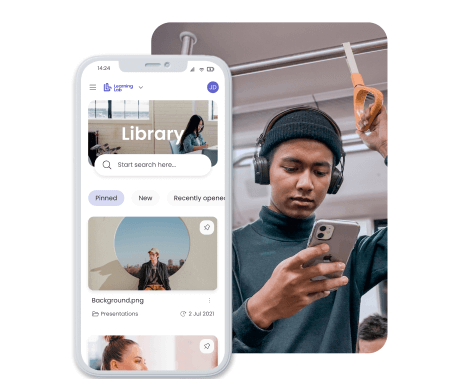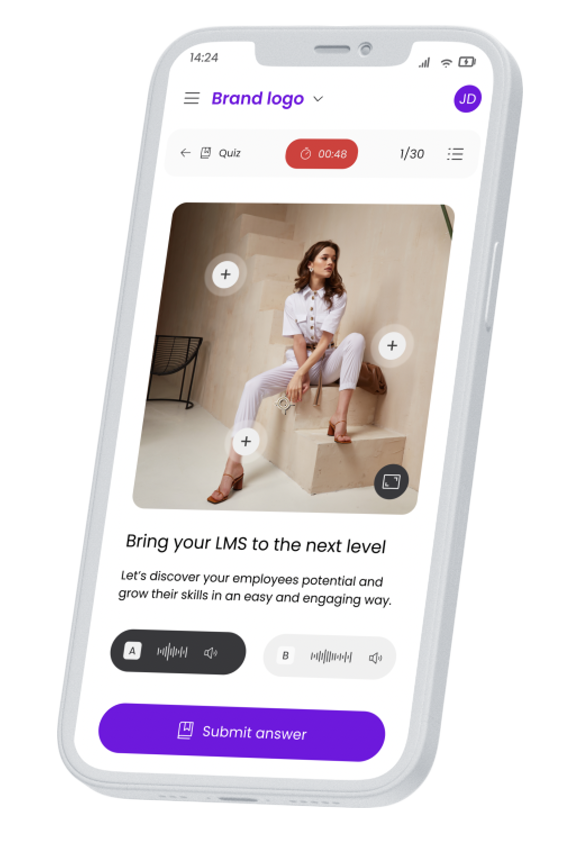Mobile Learning for On-the-Go Retail Training
The importance of mobile-optimised learning content and platforms cannot be overstated, especially in the fast-paced world of retail.
By designing training materials with a mobile-first approach, whether through web or native applications, we significantly enhance the accessibility and convenience for retail employees, enabling them to engage with learning materials anytime, anywhere.
This flexibility is crucial in catering to the diverse schedules and learning paces of individuals, ensuring that employees can learn in a manner that best suits their needs without being tethered to a specific location or device.
Incorporating video training into these platforms can drastically improve the learning experience, making it more engaging and easier to digest complex concepts through visual and auditory means.
Social learning features, such as forums and chat functions, foster a sense of community and collaboration among learners, allowing them to share insights, ask questions, and learn from each other’s experiences.
These elements contribute to a more dynamic, effective, and user-friendly learning environment that empowers retail employees to excel in their roles and adapt to the evolving demands of the retail industry.
Mobile Learning and Retail Training
Mobile learning, often referred to as m-learning, involves the use of portable electronic devices, such as smartphones and tablets, to access educational content and resources from anywhere at any time.
This approach enables learners to engage with interactive and flexible learning experiences outside the traditional classroom setting, enhancing convenience and accessibility.
Mobile learning for retail training offers unparalleled flexibility and accessibility, allowing employees to access training materials on-the-go or in-between customers, fitting learning seamlessly into their busy schedules. It also supports a variety of multimedia content, such as video tutorials and interactive quizzes, which can enhance engagement and retention, making training more effective and enjoyable.
How Learning Mobile needs to be adapted to the concept of "just in Time Learning"?
Adapting mobile learning to the concept of "just-in-time learning" requires strategic adjustments to ensure that learning content is not only accessible but also timely and relevant to the immediate needs of the learner. Here’s how this can be effectively implemented:
1. Micro-Targeted Content:
Break down learning materials into micro-sized modules that focus on specific tasks or challenges. This allows learners to quickly find and consume content that directly applies to their immediate requirements, such as preparing for an upcoming sales event or addressing a common customer query.
2. Responsive Design:
Ensure that the mobile learning platform is intuitive and easy to navigate on any device. This minimizes the time spent searching for relevant information, allowing learners to access what they need, right when they need it, without technological hindrances.
3. Search Functionality and Tagging:
Enhance the searchability of content through effective tagging and robust search functionalities. Learners should be able to use keywords to quickly locate specific learning modules, video clips, or documentation relevant to their immediate context.
4. Push Notifications and Alerts:
Utilise push notifications to alert learners about new content or remind them of training that might be relevant based on their job roles or recent interactions. This proactive approach can help in delivering timely information that enhances job performance at critical moments.
5. Feedback and Adaptation:
Implement mechanisms for immediate feedback within the learning platform, enabling learners to request specific information or updates as required. This feedback loop allows the learning content to be continually updated and refined to meet the evolving demands of the workplace.
By focusing on these elements, mobile learning can be effectively adapted to support "just-in-time learning," providing retail employees and others with immediate access to crucial information and training right at their fingertips, precisely when it's most needed.
This approach not only increases efficiency and engagement but also significantly enhances the overall effectiveness of training initiatives.
Web and Native Application LMS for Retail Training
Web and native application Learning Management Systems (LMS) provide retail training programs with unparalleled accessibility, ensuring that employees can engage with training content across multiple devices without the need for complex installations.
These learning platforms offer tailored learning experiences, leveraging data analytics to provide personalised training paths that address the unique strengths and weaknesses of each employee.
They facilitate real-time updates and feedback, allowing for the swift incorporation of new products, policies, and procedures, ensuring that the retail workforce remains agile and informed in a rapidly evolving industry.
Premium Design Mobile First for Online Training
Designing for mobile first in online training, especially within the retail sector, is not merely a strategic choice—it's a reflection of brand excellence and commitment to quality.
In the context of retail, where the brand's image and customer experience are paramount, an eLearning course transcends its educational purpose to become a vital brand exercise.
By prioritising mobile-first design, retailers ensure that training materials are not only accessible and engaging for employees on the devices they use most but also mirror the premium quality and aesthetics the brand stands for.
This approach reinforces the brand's values and commitment to excellence among employees, creating a seamless, high-quality learning experience that aligns with the brand's identity.
In doing so, mobile-first online training becomes a powerful tool in cultivating a knowledgeable, motivated workforce that embodies the brand's ethos in every customer interaction, further elevating the brand's prestige and customer satisfaction.
Skills At the Learning Lab Studio
Instructional Designers
E-learning Designers
Illustrator
Video editors
Art Directors
Creative Director
And Much More..
Benefits of Video Training for Mobile Learning
Video training emerges as a cornerstone in mobile learning, offering a multitude of benefits that cater to the dynamic needs of learners.
It encapsulates complex information into digestible, engaging formats, making learning more accessible and appealing.
The visual and auditory nature of video caters to various learning styles, enhancing retention and comprehension by illustrating real-life scenarios and demonstrations that text-based content cannot convey as effectively.
For mobile learners, especially in fast-paced environments like retail, video training enables on-demand access to precise, just-in-time knowledge and skills refreshment.
Formats:
Video Quiz
Interactive Video
Video Assessment
Virtual Classroom
Video Chat
Video Coaching
This method supports a self-paced learning approach, allowing learners to pause, rewind, and revisit content as needed, thereby fostering a more personalised and flexible learning experience.
Video training facilitates a sense of connection and immediacy, bridging the gap between digital content and the human touch, which is particularly valuable in customer-centric industries.
Adopt Social Learning for Mobile Learning
Integrating social learning into mobile learning platforms, especially in retail, can be achieved by incorporating features like chat, forums, and group discussions, which foster a collaborative learning environment.
These tools enable retail employees to share insights, solve problems together, and learn from each other's experiences and best practices, enriching their knowledge base and enhancing team cohesion.
For retail, where customer service and product knowledge are key, this peer-to-peer exchange not only accelerates learning but also promotes a culture of continuous improvement and innovation, directly benefiting the retail experience through more informed, engaged, and responsive staff.
Benefits of Nano and Micro-learning for Mobile Learning
Nano and micro-learning stand out in mobile learning for their ability to break down complex information into bite-sized, easily digestible lessons, perfectly suited for the fast-paced, on-the-go lifestyle of today's learners.
These short, focused learning modules can be quickly consumed, making them ideal for busy schedules, such as those of retail employees who need to fit learning into short breaks or between customer interactions.
The concise nature of nano and micro-learning helps in retaining attention and improving knowledge retention, as learners are not overwhelmed by too much information at once.
These formats lend themselves to just-in-time learning, allowing learners to access specific information right when they need it, thereby enhancing the immediacy and applicability of the learning content in real-world situations.
Conclusion
In conclusion, the evolution of mobile learning, particularly through the adoption of video training, social learning features like chats, forums, and group discussions, as well as nano and micro-learning, represents a transformative shift in educational methodologies, especially within the retail sector.
By embracing a mobile-first design approach, retail organisations can ensure that their training programs are not only a reflection of their brand's premium quality but also accessible and engaging for employees.
Video training enhances learning experiences by making complex information more digestible and relatable, while social learning fosters a collaborative and interactive learning environment, encouraging knowledge sharing and team cohesion.
Nano and micro-learning further complement these strategies by offering concise, targeted content that fits seamlessly into the busy lives of retail employees, ensuring that learning is both effective and efficient.
Together, these elements create a dynamic, flexible, and highly effective mobile learning ecosystem that meets the diverse needs of modern learners, ultimately contributing to the overall success and innovation of the retail industry.
Contact Us!
Simplify Learning,
Elevate Design.
IMAGINE. CREATE. CRAFT. INNOVATE. LEARN.







